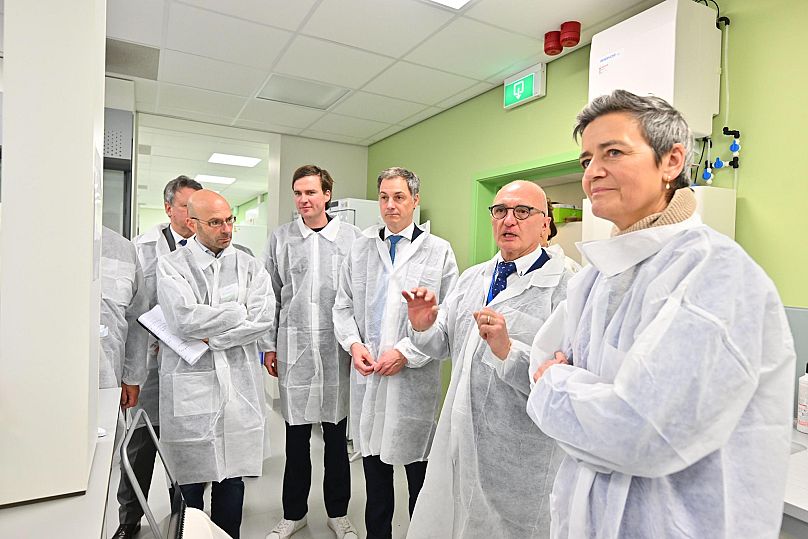A common European approach to attract capital and reduce regulatory red tape is envisaged by key policymakers to boost the bloc’s market for biotechnologies.
Belgium's Prime Minister and Commission Vice President Margrethe Vestager have called for pooled sovereignty to be a key element of an upcoming Biotech and Biomanufacturing Initiative, set to be published on 20 March, a leak of which was previously reported by Euronews.
 ADVERTISEMENT
ADVERTISEMENT
 ADVERTISEMENT
ADVERTISEMENT
As the proposal’s unveiling nears, the Belgian EU presidency invited Vestager, the commissioner responsible for the sector, to the Ghent-based facility of leading immunology company Argenx earlier this week.
On the sidelines of the event, Belgian Prime Minister Alexander De Croo complained about “havens of sovereignty” protected by EU countries in the biotech domain.
“But to win [in the biotech sector], we have to pull everything together. We should do it more often, we can be better at it if we work together,” he said.
Vestager echoed De Croo’s concerns and recalled best practices developed during the COVID-19 pandemic when she said member states delivered unprecedented solutions for health thanks to a European approach.
“Sovereignty is a good thing, but pooled sovereignty is even better because then we can do really interesting things,” she said.
The EU executive is working to transpose such a common approach in the imminent biotech initiative through the harmonisation of patents across the EU and intellectual property protection to improve financing and access to the market.
Faster approval procedures
Anant Murthy, Argenx general manager for Europe, said the EU biotech environment can boast some of the world’s top academic research centres, a strong talent pool of highly skilled researchers, and a good clinical trial environment, citing these as key ingredients for life science companies to flourish and compete on the global stage.
“Europe is incredibly attractive for emerging biotech companies but it’s incredibly difficult to attract capital,” he told Euronews.
What is missing, according to Murthy, is the pull-through of those innovations into the market to benefit patients.
Both De Croo and Vestager acknowledged Europe’s potential as an innovative scientific powerhouse but pointed out the need to translate innovation into a scalable business.
“If you can get access to capital and faster approval processes, it becomes even more tempting to move here,” said the Danish commissioner.
For Vestager, these technologies came relatively late and are now caught in some “old-school regulatory processes that are longer than they actually might be”.
“We want to renew our view on this to boost the sector,” she added.
No fear of China
Through its initiative, the EU executive will highlight the role that life science can play in different sectors, from developing new treatments for rare diseases to soil protection tools in agriculture, Vestager said, adding: “Biotech seems a very abstract thing but it is indeed very tangible and we see it in the commission as critically important for our future and our economic security.”
Last October, the commission listed biotech together with advanced semiconductors, artificial intelligence, and quantum technologies as four critical technology areas, assessing their risks in terms of security of supply.
“We're finalising our risk assessments to make sure that this is not just technology knowledge that is leaking from Europe to the detriment of our economic security,” said the EU's antitrust chief.
De Croo welcomed the commission’s assessment as demonstrating Europe’s stance – particularly toward Chinese investments in these critical sectors – is less naïve than in the past.
“I have no issue whatsoever that Chinese companies invest here,” said De Croo, calling instead for reciprocity – the possibility for Europe to do the same in China. "We are not afraid of competition – as long as it is fair,” Vestager said.











